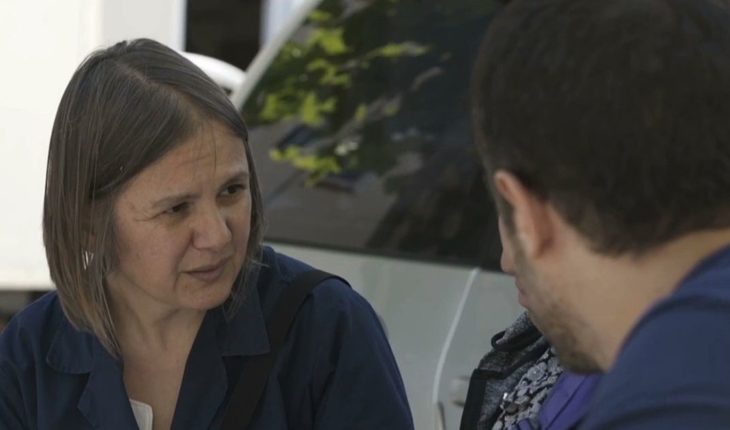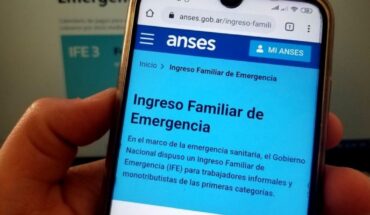A few hours ago, the femicide of Sandra Benitez, who was killed by her partner in Campana, came to light. Cecilia Gisela Basaldúa, a young woman they were looking for since April 5, was also found murdered. The gender-based violence pandemic continues to grow and continues to be victimized. Day after day, thousands of women and women from across the country report cases of violence to different agencies. Among them is line 137, which depends on the Ministry of Justice and Human Rights, which consists of a telephone number where a complaint can be made, a rescue plan activated and sending patrols if necessary. In this context, the documentary “Line 137″ was released, which focuses on assistance to victims of gender-based violence. It was declared of interest by INCAA and premiered internationally at the International Festival of new Latin American Cinema in Havana, and is available on the Cinear Play platform for free. Filo.News spoke with director Lucia Vassallo, who revealed how the behind-the-scenes film was, the importance of the film in quarantine times, state responses, patriarchal justice and more.” The documentary was always intended as a fighting tool”
Photo: Press Gentile
Originally from Buenos Aires, the director’s film debut was with “La cárcel del fin del mundo” (2013), with which she won the 2010 InCAA Digital Films award, premiered in 2013 at the Mar del Plata Festival and aljazeera International Documentary Film Festiva. After that work, where she covered the issue of human rights, the director decided to premiere her work focused on gender-based violence. Why is the woman’s look behind the camera important for this theme?” My vision as a female director is fundamental because no one better than us, to put us in the place of another woman and understand her internal and external conflicts”, confesses Vassallo.When she was a teenager, she said, her mother taught her some books by Simone de Beauvoir, the historical feminist reference, so she began to delve into the movement. “Milito as much as I can so that women, lesbians, transvestites and trans people can live in a world where we do not kill or go through so many inequalities every day, even in our domestic lives,” she says.” The feminist movement dates back several decades, I feel that 5 or 6 years ago this part is what is happening is that it is already an international cry that will not shut up until they listen to us and respect us, it changed me in every way because the personal is political and vice versa,” he adds. In this sense, Vassallo confesses, the documentary was his “fighting tool” and his “military way and trying to contribute something to this movement”. For this, he chooses to privilege the voices of those who put body and soul to face it; those who receive cases day by day in a sexist culture in which all, in some way or another, are immersed. The behind-the-scenes documentary
According to the director, the idea of making the documentary was born in 2016 with the journalist Marta Dillom, who was in charge of working on the script: “I found it essential to be able to talk about an urgent issue, the pandemic of sexist violence that as a society we are not being able to control. Line 137 does an inconsosibly work that I think is essential for it to be federalized,” he said. Over 82 minutes, the film brings to the fore the word of social workers and psychologists who attend, help and accompany different women who suffer gender-based violence, with an intimate and careful camera. The director told how she managed to work on this idea: “It took me months of accompaniments in the police stations with elles and in the call center to be able to establish a bond that would allow me the intimacy necessary to achieve this film. The victims were contacted in each intervention and the first to address them were the psychologues and social workers of the Program the victims against violence, i.e. Line 137.” Once the situation was more controlled and contained they were told that we were making the documentary that puts the focus on the workers of Line 137 and that their identity was not going to be revealed. If they wanted to let us advance on the shoot, it was just there that the camera was on,” he added. The documentary was going to be released in theaters on April 16, but they finally decided to publish it online where it got a big impact: “It transcended my expectations and also the media that are specifically of shows and cinema. People congratulate us, consider it necessary and very painful, and I think that part of reality is; I just showed it from a little-known place, the intimacy of violence.” Why is its premiere important in quarantine times?
Line workers Photo: Press Gentile
Since its inception, the Victims Against Violence Program has been directly involved in conflicts of sexist, sexual and domestic violence within the scope of CABA, Chaco (Resistance), and Misiones (Posadas, Garupá, El dorado and Oberá). In this sense, the professionals are responsible for listening, containing and guiding the victim, his relatives, neighbors, or the institution that has communicated, and also of filing the complaint, requesting protection measures and making them effective, managing the entrance to a shelter, attending the hospital, articulating with his family / social network of support, among other actions to achieve their shelter. However, in recent weeks, complaints of gender-based violence have grown across the country that coincides with the quarantine decree, considering the privilege of having a home, following the expansion of the coronavirus pandemic. According to different feminist organizations, at least 7 victims of sexist violence were recorded in the first 15 days of social isolation, preventive and compulsory, as well as arbitrary and violent detentions of trans, transvestite or LGBT people. As for line 137, there was a 67% increase in calls in April compared to the same month in 2019.” The number of distress calls grew on lines 144 and 137 and it is urgent that these aid measures at hand be known. Also because the film is a metaphor about being able to talk, to call, to enunciate, to take out what happens to us inside so that we can start to solve it, speech is the first and great step”, confesses the director.” Sexist violence is mostly born in every house, within intra-family ties because today’s societies are patriarchal. And the fact that you are obliged to spend 24 hours swearing the worst of the cycles of violence whether physical, psychological, economic and sexual,” Vassallo says. In addition to the line the State has certain measures such as line 144 of national scope, free of charge and anonymously, The numbers of WhatsApp 11-2771-6463, 11-2775-9047 and 11-2775-9048, the mail linea144@mingeneros.gob.ar or the possibility of ordering a red barbijo in pharmacies. But is that enough? “It is necessary for the State to invest in specific aid policies such as mobile devices that Line 137 has where in-person aid, several should work in each city and town in the country because telephone support is insufficient,” Vassallo said.” The work of Line 137 is excellent, only they need a lot more resources, people, mobile equipment, cars and the federalization of the program,” she concludes. In times of pandemic, it is necessary to highlight the invisibilized work that workers do day after day against the pandemicide of femicides, where there is no beard to protect us. In this note:





